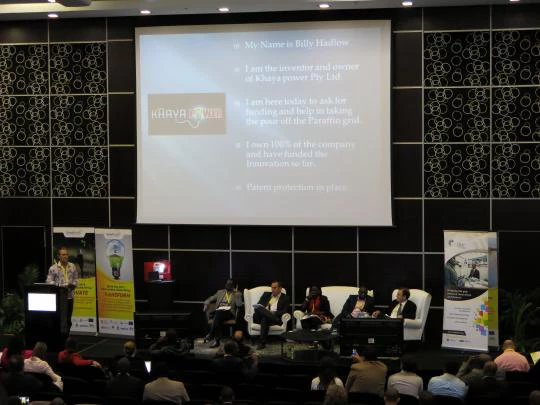“You have a good social project, but it is not an investable company”, I heard fellow judge and technology activist Mariéme Jamme say to a South African entrepreneur who had just given his best business pitch. He was taking part in the Dragons’ Den at the 5th Global Forum on Innovation and Technology Entrepreneurship, a fantastic 3-day learning and networking event organized by the World Bank’s infoDev and the South African Department of Science and Technology. You could see the entrepreneur (let’s call him ‘B.’) gasping for air, and one could hear a pin drop in the completely filled auditorium of the Global Forum. Over 800 people, mostly entrepreneurs, financiers, policy makers and technology ‘evangelists’ from all over the world had gathered here.
I was in East London, South Africa on a stage, jointly with ‘Dragons’ Wesley Lynch, founder of AngelHub South Africa; Thomas Debass, Deputy Special Representative at the US State Department; Mmboneni Muofhe, Deputy Director-General with the South African Department of Science and Technology and Marieme, who did her best to become as ‘popular’ as Kevin O’Leary (also known as Mr. Wonderful) on the ABC reality show Shark Tank, the US equivalent of the internationally acclaimed TV series Dragons’ Den.
Over the course of two sessions, we saw the pitches of twenty of the most impressive and inspiring technology-driven entrepreneurs from developing and emerging economies in front of us. I was pleased to see that almost half of them were female and about two-thirds from the African continent. Only five of the ‘Top 20’ could win a prize, which was the judges’ painstaking task. We rated the business ideas according to commercial potential, long-term success and impact on society. Before the entrepreneurs were thrown into the den of the Dragons, they had received training and mentoring by members of the infoDev team and a few accomplished investors. Many of them had clearly benefitted from these ‘boost’ sessions.
To tell the truth, I was happy to be a judge and not on the other side. Entrepreneurs had 3 minutes to make the pitch, and then we – the five judges – scrambled to ask our burning questions within 3 minutes. A powerpoint clicker that was off for a couple of seconds could already destabilize the pitching entrepreneur for a brief moment, and some tried to bend the rules by popping out a fantastic video at the end of the 3-minute interval. All the entrepreneurs had the heart-felt sympathy, applause and cheers of the hundreds of people in the audience. Despite the few ‘spiky’ comments by fellow judges, the atmosphere was positive and collegial.
I was deeply impressed with the quality and richness of ideas at the Global Forum. As a judge, I was looking for high-growth entrepreneurs who found sustainable companies creating jobs, impacting positively on society. And we did find them.
After a one-hour deliberation behind closed doors, and an admittedly heated discussion, we agreed on the five best entrepreneurs with innovative solutions. The first prize was awarded to Thuy Truong, the impressive CEO of Vietnam’s Greengar for its fun and useful mobile apps for education. The second prize went again to a female entrepreneur, Stella Njoki Kariuki, of Kenya’s MPAYER for its application that enables financial transactions using mobile money as well as cash. Third prize went to South African Afroes for its mobile applications delivering positive educational messages. Runners up were Amant Antenna from Egypt for its novel cellular-based antenna technology covering multiple frequency bands, and Armenia’s MicroForester for an app that tracks reforestation projects. Aside from the prize winners, all the Top entrepreneurs invited to the competition were called on stage and received recognition for their achievements.
And entrepreneur ‘B.’? He wasn’t part of the Top 5, but he got a standing ovation from the cheering crowd as he walked on the stage. He clearly won the sympathy prize.



Join the Conversation